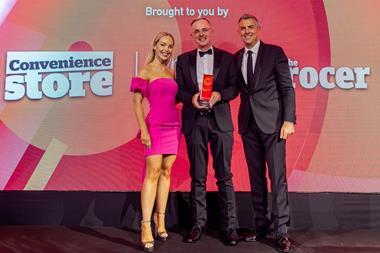Negative inflation is putting pressure on prices and margins. Here our C-Store Champions reveal their plans for dealing with deflation.
Clive Sheppard, director of the Chartman Group, eight Spar forecourt stores
Clive makes sure his margins stay high by concentrating on being competitive and clever marketing
Dee Sedani, two One Stop stores, Derbyshire
Dee pays close attention to overheads and has invested in energy-saving equipment to keep a lid on costs at his stores
Susan Connolly, four Spar stores, East Wiltshire
Susan looks for the products that provide the best margins to make sure she maintains profitability and can avoid price-cutting
Vickram Karavadra, Londis Late store, Northampton
Extending the number of suppliers he uses and focusing on promotions means Vickram is seeing higher profits at his store
Do you feel that prices are being deflated in the marketplace?
Clive: Yes, there is increased pressure to push prices down. In our forecourts this is mostly influenced by the cost of oil, and in our shops we have seen the prices of our products drop. Now we have to work even harder and be even more competitive.
Dee: Deflation is definitely evident; margins are smaller, retail prices have deflated and pack sizes are getting smaller. For example, a pack of cigarettes used to contain 20 cigarettes, then it was 19 and now it’s 18, yet they still cost the same. And Twix bars, well, they have got smaller and smaller over the years.
Susan: No, I haven’t noticed any retail or wholesale prices decreasing - we certainly haven’t been decreasing ours. The only noticeable change has been that Spar has started running more promotions, therefore it must be getting its products in cheaper.
Vickram: Not at all, prices seem to be going up on most of the products supplied by Londis. They are our main symbol group, yet we have had to find other suppliers to get our products from over the years. If we didn’t we wouldn’t be where we are now.
Have you been forced to reduce your prices in response to competition?
Clive: We have reduced our prices, but we have also noticed that suppliers and manufacturers have reduced theirs and this is reflected in what we sell them for. We have specifically reduced the price of milk, even offering 2ltr for £1, to stay in league with the multiples.
Dee: The areas I have really noticed where we have had to reduce prices are on the everyday products such as milk, bread and eggs. We now offer a loaf for £1, 2ltr milk for £1 and half a dozen eggs for £1.
Susan: So far we haven’t had to reduce our prices, but we have always been a little more expensive than other stores such as Tesco and Co-op. We make up for this in our value, customer service and variety, though.
Vickram: With discounters such as Aldi out there, you have to reduce prices in some places. I have a very specific market and I know what they want. I don’t want to cut my quality to be able to offer cheaper prices, so it is tricky. My milk and bread prices are lower than they used to be, but I make up for this in other areas such as alcohol.
What are the implications of deflation for your business?
Clive: Short term it’s quite positive as people’s money is going further and therefore they are spending more. In the long run it could be totally different. People may stop buying certain products right away when they realise things are just getting cheaper and cheaper. We aren’t at this stage yet, but in six months we will have a better idea, and it will be the big ticket purchases which are hit first.
Dee: It’s hard to tell at the moment as it hasn’t quite hit yet. But looking to the future the minimum wage is meant to be going up in October and the multiples seem to be making big price cuts, something we have to follow if we want to keep our customer base. Before, price and wages used to balance well, now not so much.
Susan: We just need to keep an eye on the market. Everyone’s different and each retailer has a different way of dealing with things. If we did start to see a drop in our store sales then we’d take further action to combat the consequences.
Vickram: No, I think being a convenience store retailer means we have a little more flexibility, unlike the multiples who may feel it more. Yes I am competitive, but I am also fair, because at the end of the day people still need to eat and drink.
Are you finding that products sell better when they are on promotion?
Clive: Definitely. People are always on the lookout for a bargain and running a promotion is the perfect way to grab their attention. We specifically use promotions to have a ‘clear out’ of the store, to get rid of any older stock that is season-specific such as Easter eggs.
Dee: Shoppers are savvy these days and always on the lookout for a promotion. The promotions which work the best are those on impulse products such as confectionery. Multipacks and big packs of beer do well on promotion, too.
Susan: Products always sell better on promotion and therefore we run a lot of them. They encourage people to spend; for instance, these days it doesn’t matter which coffee you usually drink, you drink whichever’s on promotion at the time.
Vickram: 100% - I focus most of my time on promotions. I run Londis’ three-weekly promotions and devise a lot of my own, usually on particular soft drinks, alcohol and multipacks when I get them for a discounted price from Bestway.
How is your profit margin compared with 12 months ago?
Clive: Our margins aren’t as strong as they were. It is a slow decline, but it makes a difference. We have had to really step up our game in order to sell more products to make the same profit. We have done this through advertising and marketing, both in the store and on social media, specifically Twitter.
Dee: In one word, down, by at least 2-3%. The nature of the business has changed and there is a lot more competition than there used to be.
Susan: Across all of our four stores our margins have gone up by almost 8%. Each manager has a target to hit in each store and, with the help of the team, they work hard to reach it. To keep our margins up we seek the highest profit-making products, such as our fruit and veg which is sourced locally and which we make between a 60% and 70% profit margin on.
Vickram: It is better, mostly because of the amount of products we source from outside Londis. All of our fresh fruit and vegetables, milk, eggs and bread are sourced from local suppliers because I can get them for less, which means I can sell them for less.
Would you consider accepting thinner margins?
Clive: If I had to I would, but by being proactive and really being the driver of my business as I have been recently, I hope I won’t have to accept margins which are too thin. It’s a challenging time, but with a challenge comes an opportunity.
Dee: I’m going to have to. If I put my prices up people will find another store to shop at and I’ll lose out. For now, I’m just going to have to keep working hard and watch the market.
Susan: No, there’s always a way to grow and we just wouldn’t be happy succumbing to the lower prices. In summer, especially, it’s easier to drive margins so we work extra hard, finding the right products to give us bigger margins to cover the slight lull which comes with winter.
Vickram: No, at the moment there are no signs. I need to maintain my margins in order to keep a good business running. I make good margins on my produce from local suppliers which I take with a sale or return contract so that I never lose out too much.
Would you consider introducing more promotions?
Clive: Yes, it’s exciting running promotions, seeing the extra sales and knowing that you are offering your customers good value for money. If I need to I will chase suppliers and ask them to run further promotions, as well as running more of my own in store.
Dee: We run all the promotions which our group, One Stop, offers, but we aren’t allowed to introduce any of our own. I would have liked to, but at the same time it is a lot easier and less to worry about having One Stop sort it for us.
Susan: We have recently set up a £1 confectionery promotion next to the till to encourage impulse buys. We also buy in more of the products which are popular among our customers in specific stores, such as Monster energy drinks, and offer them at the promotional value of two for £2.
Vickram: Most of my products sell better when they are on promotion, so why wouldn’t I? I have end bays on every aisle, stands and promotional bays throughout and with the ability to make a lot of my own POS material the promotions could be endless.
Have you seen other business costs going up?
Clive: We have noticed that the cost of infrastructure on forecourts in particular has risen because there are so many rules and regulations with which they must comply.
Dee: Well, wages have, and business rates, too. Retailers just need to react quickly and be proactive about making the right changes.
Susan: Our energy bill has stayed the same over the past year. But if there is an increase we tend to shop around a bit and compare until we have the best one. We are in the middle of putting in a butchery area in our Pewsey store and will be expanding our Tidworth store at the end of the year, and this is definitely going to add to the costs.
Vickram: I haven’t noticed a change in business rates, but there is a lot of legislation which has come in over the years, much of it threatening fines if you don’t comply, which is more of a worry.
What have you done to reduce business costs?
Clive: We have invested in solar panels and the returns are stacking up well compared with the amount we invested. We have also put doors on the chillers and now run the whole store with LED lighting, which has definitely had a positive impact.
Dee: Back in 2011 I was one of the first retailers in the country to put doors on my chillers, and then in 2013 I was persuaded to install LED lighting, a very beneficial move.
Susan: We have contemplated putting doors on our chillers for a while now, but being old fridges it’s just too expensive to get them built onto them. However, when new fridges get fitted in the Pewsey store for the butchers we will make sure they have doors on them.
Vickram: I really want to install new fridges with doors and LED lighting. The fridges will be done soon - we are looking at a £40,000 spend on sorting the area out. But, as much as a I want them, I can’t yet afford to put LED lights into the store as we only had it refurbished a few years ago.
Staff wages
Is deflation going to affect what you pay your staff and your ability to award pay rises?
Clive: Yes, people’s expectations will slowly begin to change. With inflation the cost of living goes up and that is reflected in wages. Now the cost of living is going down, will that be reflected in the minimum wage? It’s unknown territory at the moment, but we try to give our staff a good rate of pay.
Dee: We haven’t looked at our staff’s hours yet, but I’m sure they will have to decrease, by roughly an hour, if deflation continues. I won’t be looking forward to Christmas if that has to happen.
Susan: It shouldn’t do as we, as a business, are very good at forward thinking. We already pay our staff more than the minimum wage because of our forward thinking. Retailers need to think where is the money going to come from? And if the answer is the retailer themselves then they need to start getting in those wide-margin products.
Vickram: No, not that I can see at the moment. In fact, I just gave a few of my staff a pay rise. As long as I can keep my margins up, I’ll keep my figures up. It’s all about smart retailing.
Profitability
Are you expecting to be more or less profitable this year than you were last year?
Clive: We are increasing our turnover so hopefully we will be more profitable. We have worked hard to give customers what they want and we will continue to do so to ensure the year continues positively.
Dee: We expect to be less profitable. We are definitely not bringing in as much as we were last year and it is tough, but we just have to keep fighting through.
Susan: We’re hoping we will be more profitable. Once our renovations are done we are really hoping to see an increase in our takings. The butchery will be run by a butcher well-known in the area and we are hoping that his presence and the meat he provides will attract more customers, who will also shop for other produce in our store.
Vickram: Always more - it’s what we aim for. We’re a business, after all. We are always on the lookout for the right suppliers, and as long as we get this right, coupled with the right offering for our customers, I have faith the store’s profitability will continue.
















![C-Store_Champions_logo-CHOSEN[1] 2023](https://d2dyh47stel7w4.cloudfront.net/Pictures/380x253/6/5/7/301657_cstore_champions_logochosen12023_817064.jpg)




No comments yet